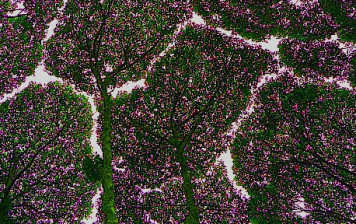
Prof. Mehmet Efe Çaman
The Gülen movement is one of two marginalized groups in present-day Turkey along with the with Kurds. However, the situation was quite different 10 years ago. The people who launched a fierce campaign to “finish off” the Gülen group in today’s Turkey once considered it their closest ally.
The politicians who currently rule the country used to send their own children to schools run by the movement. They were subscribers of the Zaman daily. They often appeared on Gülen-affiliated TV channels, calling Fethullah Gülen “Hocaefendi” – a title his followers use to refer to him with reverence.
Whenever someone criticized Gülen, the same politicians rushed to denounce those critics even before his own followers did. These politicians issued commemorative coins for the Turkish Olympiads, a series of annual cultural events the Gülen movement had been organizing. President Recep Tayyip Erdoğan gave a speech to thousands of attendees during one of these events and invited Gülen back to Turkey after he expressed his “longing” in the stands of an Istanbul stadium in June 2012.
The Gülen movement supported the ruling Justice and Development Party (AKP) for a long time. For the movement, which had never engaged with any political parties, to follow along after a political party could sound hollow. But it’s not fair to ignore the irreconcilable differences between the AKP’s discourse, political goals and actions in its first decade, namely the 2001-2011 period, and the same party’s discourse and actions today.
Back then the AKP used to be a reformist political party striving to accomplish European Union reforms in its first years; the party seemed to embrace liberal democracy and uphold the rule of law. Not only the Gülen movement but also liberals, Kurds, minorities, leftists and pro-EU circles supported the AKP in those years. On the other hand, some of the other political parties were dragging their feet when it came to incorporating EU reforms in the same period.
For instance, nationalists in the Republican People’s Party (CHP) regarded EU reforms aiming to improve the country’s institutional democracy as concessions given to the West. Therefore, the CHP never supported the AKP in its steps to realize reforms. Likewise, the Nationalist Movement Party (MHP) detested the EU reforms. The MHP opposed the progressive agenda – particularly the intention to resolve the Kurdish issue politically rather than militarily – just as the nationalists in the CHP did.
The Peoples’ Democratic Party (HDP) and Kurdish political circles were happy about the AKP’s pro-EU political stance. A positive step to direct dialogue between the Turkish state and the insurgent Kurdistan Workers’ Party (PKK) gratified the Kurdish politicians. They saw the move as the most critical opportunity in Turkey’s history to resolve the Kurdish issue. In brief, blaming the Gülen movement for supporting the AKP, thus paving the way for today’s AKP regime, is manifestly ill-founded and unfair.
The AKP considered the Gülen movement in those years a fairly legitimate element of Turkey’s civil society. On the other hand, the Gülen movement regarded the AKP as a genuinely democratic, favorable political party. These approaches set up a natural plane of cooperation.
Zaman Daily Broke the Media Monopoly
The Gülen movement had a certain influence on Turkish politics between 2002 and 2011, which was possible with the help of the group’s human resources and its power in the media sector. As a civil society movement with its primary focus on education, the movement gave weight to establishing schools, procuring scholarships for high-ranking students and founding universities.
Its power in the media came into effect as its several media outlets, including the Zaman daily, offered an alternative to the settled secular/Kemalist elite media. There used to be a lack of alternatives in the Turkish media landscape due to that Kemalist monopoly, but Zaman broke the ice. Zaman not only opened its doors to writers from the movement but also to liberal-democrat columnists. This unique selling proposition ensured that the Zaman daily’s audience was as diverse as it gets. Apart from the followers of the movement, the newspaper attracted readers from other religious and liberal groups.
Between 2002 and 2011, the primary motivation shared by both the AKP and the Gülen movement was to make Turkey a democratic country. Both the AKP and the Gülen movement had a strong view to ending the military-bureaucratic veto regime that had presided over the country since its foundation and of upholding the rule of law based on EU-style liberal democratic principles. In fact the closest the country ever approached a functioning liberal democracy was without any doubt the period between 2002 and 2011.
It would not be wrong to claim that the modern political history of Turkey is a history of a corrupt partisan spoils system. The AKP has also worked to set up its people in public office, which is not odd. All ruling parties in Turkey have attempted to install their own people in the bureaucracy. For many, “getting into the body” of this giant and powerful “Leviathan” was the only way to avoid the Turkish state’s wrath. This understanding is the core of the political fight in Turkey’s history.
While the AKP started employing people close to its Islamist ideology, it also embraced the seasoned human resources of the Gülen movement, considering the group “on the same page” with them and sharing a similar world view. As a matter of fact, the Gülen movement had much more qualified human resources than the other religious or Islamist groups. Verily, even if the AKP did not prioritize Gülen followers in the public sphere, the percentage of public officers close to the movement increased over the years, anyway.
The Gülen Movement did not Infiltrate the State
The Gülen group did not infiltrate the bureaucracy but participated in it. If there is to be a “responsible” party, then it is the AKP government that made the political choice to hire the movement’s followers. Besides, it’s relevant to highlight that employment requirements in the state are designated in the law. And the government is fully responsible for the hiring process in the bureaucracy and public sector. Accordingly, just as the constitutional order determines in any democratic country, any citizen regardless of her or his personal worldview can become a civil servant in Turkey. Discrimination based on non-objective criteria cannot be done.
What is important is whether a person is qualified according to objective job requirements or not. The AKP has been the sole decision-maker for years. If there was any irregularity during the hiring of skilled employees, the responsibility is with the AKP. The AKP should have presented objective evidence and started an investigation regarding any alleged extralegal practice during the hiring processes in the Turkish public sector for which it was constitutionally responsible.
It’s unacceptable to persecute a whole group based on unfounded allegations nourished by persisting bias. However, this is what we witness happening in Turkey today. Allegations about the movement that it “stole” the questions of some centrally run entrance exams to register in a university or hold public positions are widely accepted in Turkish society, whereas the claimants have yet to put the evidence on the table to back these allegations. Numerous people have been labeled and dismissed from their posts with presidential decrees over baseless allegations.
For sure, prosecutors should investigate the claim that “the Gülenists stole the exam questions.” But they must set forth evidence if a crime was committed, and if it was, who committed it and whether or not it was organized or personal misconduct. However, we have a “small problem” in that context: Today’s Turkey, where the judiciary is de facto entirely under the government’s control and the constitutional order is not abided by, doesn’t facilitate fair and lawful investigations. The very biased and widely accepted discourse claims that all “Gülenists in public service” acquired their posts by “stealing the questions.”
This conviction without evidence and a trial cannot be questioned today, since everybody who criticizes it is labeled as a “Gülenist” and purged. Ankara’s mass crackdown on the alleged followers or supporters of the Gülen movement includes dismissing and terrorizing hundreds of thousands of people without evidence of a crime. People are simply persecuted and are expected to “prove their innocence” as in Third Reich Gestapo procedures.
Claims of Conspiracy against the Military
Some circles in Turkey claim that the Gülen movement conspired against the Turkish military by masterminding corrupted investigations such as the Ergenekon, Balyoz (Sledgehammer), Sarikiz and Military Espionage cases. They claim that the criminal investigations in these cases and court procedures were fabricated plots to topple then-Prime Minister Erdoğan. Those circles deliberately overlook the fact that these cases were based on serious evidence, including voice recordings of military meetings and official documents. They manipulate the public on purpose through massive propaganda to make people forget about Erdoğan and his cabinet’s open support for those legal cases. They attempt to artificially correlate lawsuits against the alleged coup plotters and corruption cases of December 17, 2013, which came up with massive corruption and money-laundering allegations against AKP ministers and Erdoğan’s inner circle.
The conspiracy theory of the Turkish government that has become the mainstream perception in Turkey claims that the Gülen movement was the mastermind of all of those cases. However, there are some basic questions to be asked in order to understand what happened in those legal investigations.
1- How can anyone hide the concrete shreds of evidence in the Ergenekon cases?
2- How can anyone ignore the concrete shreds of evidence in corruption investigations targeting AKP officials?
In a bid to whitewash the existing evidence against them in the Ergenekon cases and the December 17, 2013 corruption cases, the government and the suspected individuals and groups assert that the Gülen movement launched those investigations and that it was a setup. Their cooperation against and targeting the Gülen movement as a scapegoat is based on their common interest to hide the ugly truth.
What is Terrorism? Who is a Terrorist?
The AKP claims that the Gülen movement is a terrorist organization. Calling dissidents “terrorists” and cracking down on everybody who disagrees with them is widespread in authoritarian or semi-authoritarian regimes. In fact, under the rule of law non-violent groups cannot be accused of being terrorists since resorting to or complimenting violence is the essential decomposition point separating a terrorism act/group from the others.
The AKP blames the Gülen movement for instigating a July 2016 abortive coup. But the Turkish government still has not been able to prove the affiliation of the soldiers involved in the coup with the Gülen movement. It has not been able to prove whether any soldier received instructions from the movement. Moreover, it’s unclear if the coup of July 15, 2016 was a real military coup or a government-controlled staging. No members or followers of the Gülen movement were involved in any violent act even after hundreds of thousands of them were detained, arrested and dismissed from their jobs. Countless criminal investigations have failed to find a weapon or object to use as a weapon during raids on the homes of the group’s alleged members. Is the Turkish government seriously expecting that the whole world is supposed to believe there are (imaginary) “terrorists without weapons” simply because it wants it to be so?
“‘FETO’ Acronym is conjured up to Reinforce the Witch-Hunt
There is no evidence showing the Gülen movement is an organized crime group or a terrorist one. The movement is a scapegoat in today’s Turkey, pointed to as a target both by the state (regime) and the opposition.
The grass roots of the AKP, MHP, CHP, IYI Party and partly the HDP support this idea. The AKP hates the movement for two reasons and wants to suppress it. 1- Erdogan laid the responsibility for the corruption investigation into himself and his party at the Gülen movement’s door. 2- The AKP saw the movement as a rival. The nationalist MHP hates the movement due to the Gülenists’ pro-EU and pro-West positions. The secular CHP’s nationalist/Kemalist base hates the Gülen movement due to their bias against all Islamists of non-secular groups and considers it a radical, fundamentalist and anti-Atatürk religious sect. The CHP accuses the Gülen movement of masterminding the coup-plotting cases such as Ergenekon, Sledgehammer and Sarikiz. The pro-Kurdish HDP doesn’t want to be entirely excluded from the “state” and uses anti-Gülenist discourse from time to time. And the Gülen movement’s cultural Turkish nationalist stance in the past disturbs supporters of the HDP.
No doubt the Gülen movement should evaluate its positions in the past in light of allegations about itself and initiate a purification. The mass punishing and unlawful prosecution it faces, on the other hand, are violations of fundamental rights. It’s time for all social factions in Turkey to question human rights violations and the discrimination and persecution the Gülen movement faces.
Source: Turkish Minute, August 26, 2020.
Tags: Defamation of Hizmet | Gulen Movement |Related Articles

Why Is Turkey Targeting Hizmet? Questions about Erdoğan’s Post-Coup Crackdown
But if Hizmet was not involved, then who? The Turkish press has called out all the usual suspects: the United States, Israel, the Vatican, Kurdish nationalists, ISIS. Some…

Channels through which Hizmet disseminates its core teachings
More specifically, the following are some channels through which Hizmet instills, disseminates and popularises its core teachings among the wider Muslim public. Where the work is religious in…

Principles of the Hizmet Movement
Every social or spiritual group may have both institutional and non-institutional aspects. In relations between the individuals who have an institutional role and those who do not, the…
